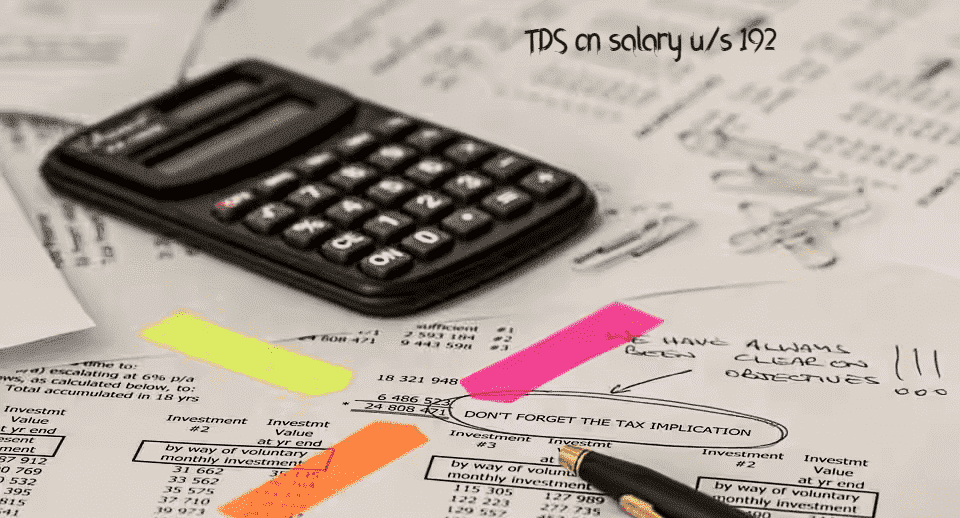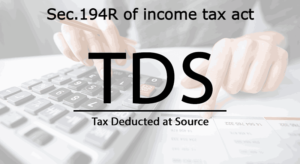TDS on salary u/s 192 casts an obligation on employer to deduct TDS on salary payment, if salary of employees exceeds basic exemption limit.
What is TDS on salary u/s 192?
TDS on salary means tax has to be deducted by employer at the time of crediting salary in to the employees account. The amount deducted from employees account is deposited with Govt by employer.
Before deducting employer has to get TAN registration. In other words, it is the amount of money deducted as tax by the payer before making payment for any service or job.
In brief, TDS is a form of tax , which is paid to government regularly. The section 192 of income tax puts an responsibility on payer to deduct and pay TDS to Govt on timely basis.
Who is required to deduct TDS on salary u/s 192?
Further, every taxpayer who pays salary/wages is require to deduct TDS u/s 192. And TDS deducted is to be deposited to govt regularly. Employer who pay salary to employee (resident or non resident )is required to deduct TDS every month under section 192.
Employer means any taxpayer i.e. Individual,HUF, Firm And AOP & BOI,Trust, Company, Local Authority and Artificial Judicial Person.

What is Rate of TDS Salary?
As i have discussed, TDS is calculated on the basis of estimated income earn during the year. No rate is prescribed for TDS under section 192.Now, this is to be computed on presumptive income by computing the estimated tax liability. Therefore, TDS rate on salary = Estimated Total Tax Liability/Period of employment.
When TDS is to be deducted?
Again, TDS is to be deducted at the time of payment to employees. This deduction is made when the salary income of employees exceeds the basic exemption limit.
Further, the basic exemption limit for F.Y. 2022-23 and 2023-24 is 2,50,000 and 3,00,000 under new tax regime . It means if employees earns salary in excess of exemption limit, then employers are require to deduct TDS on such salary.
For instance The estimated annual salary of Mr. A’s is Rs. 3,20,000 in financial year 2022-23 ,Mr. A’s Employer will have to deduct TDS on the salary on a monthly basis.
In addition, TDS is requires to be deduct in case of advance salary and arrears of salary.
How to calculate TDS on salary?
Again, TDS is deducted on estimated income of employees. Employers are required to estimated net salary of employees. The deductions and exemptions like standard deduction u/s 16(i) & Profession tax u/s 16(ii) and deduction under chapter via ( 80C to 80U) are deducted from gross salary in order to compute net salary. Further, Income other than salary like rent income , other source income if declare by employee is to be add back while computing TDS .
How do you know whether TDS deducted by employer has actually been paid to Govt or not?
Now ,when Employer deducts TDS, he is require to provide TDS Certificate to employee. TDS certificate is called as form 16. Futher, Form 16 contains information such as tax deducted by employer , salary details and any other income and deductions declared by employee.
Furthermore, TDS paid by employer is reflect in Form 26AS of employee. If Employer fails to make payment of TDS deducted than form 26AS does not shows TDS deduction details. Hence, employee can cross check the figure of TDS deducted through 26AS. Moreover , Employee can ask them to pay TDS on time.
What is time limit for depositing TDS ?
In addition , TDS deducted is to be deposited on or before due dates. That is ,TDS deducted from april to feb = 7th of subsequent month and for march = 30th april.
What if employer fails to pay TDS to Govt?
If employer does not pay TDS to government on time . Following are the consequences:
1.) Interest is required to be paid if employer does not deduct or deducts but fails to pay government.
2.) Disallowance of salary expenses i.e.
- 30% of salary paid to resident
- and 100% of salary paid to non resident
Let us learn with an example i.e. how TDS on salary is deducted ?
ABC Ltd. an Indian Company, pays Rs. 8,40,000 to its chief financial officer Mr. Aniket as gross salary including taxable allowance and bonus. Besides that, it also provides non monetary perquisite which cost the company Rs. 1,50,000. And Income from other sources 50,000. Discuss the TDS implication in the hands of ABC Ltd. as well as in the hands Mr. Aniket as regards non-monetary perquisite.
Solution:
Computation of Average tax
| Particulars | Amount(Rs.) |
| Gross salary Non-Monetary Perquisite | 8,40,000 1,50,000 |
| 9,90,000 | |
| Less: Standard deduction u/s 16(ia) | (50,000) |
| Net salary | 9,40,000 |
| Income from other sources | 50,000 |
| Total Income | 9,90,000 |
| Tax liability as per slab rate plus education cess | 73,500 |
| Average rate of tax (Rs. 73,500/9,90,000×100) | 7.42% |
In brief, the company can deduct Rs. 73,500 at source from salary of the chief financial officer. However, Non-monetary perquisite is taxable . Whereas, company pay tax on non-monetary perquisite , the same is not deductible as per section 40(a).
Lastly, the company pays tax on non monetary perquisite , as per section 10(10CC) is not chargeable to tax in the hands of employee .
Note: You can refer income from salary https://taxandfinanceguide.com/calculation-of-income-from-salary-new-tax-regime/ and slab rate as per new regime https://taxandfinanceguide.com/income-tax-slab-rates-new-tax-regime-fy-2023-24/
Frequently asked Questions
1) Can TDS be deducted on Non Resident employee?
Yes, TDS is deducted on all employees if salary income exceeds basic exemption limit.
2) What is the rate of TDS on salary ?
There is no fixed rate for TDS u/s 192. TDS is deducted at average income tax rate for financial year.
3) What if TDS deducted is more than actual income?
You can claim income tax refund by filing income tax return on or before due date u/s 139(1).
4) Is TDS deducted every month?
Yes, TDS is to be deducted every month.
5) Do i need to file income tax return if TDS is already deducted by my employer?
Yes , You should file income tax return if your income is above basic exemption limit. Because TDS is paid estimation basis. And than,you can get refund for paying more or need to pay more tax for deducting less tax.




[…] Salary- https://taxandfinanceguide.com/tds-on-salary-u-s-192/ […]
[…] Refere: https://taxandfinanceguide.com/what-is-tds-in-income-tax-act/ and https://taxandfinanceguide.com/tds-on-salary-u-s-192/ […]
[…] https://taxandfinanceguide.com/tds-on-salary-u-s-192/ and […]
[…] https://taxandfinanceguide.com/tds-on-salary-u-s-192/ and […]